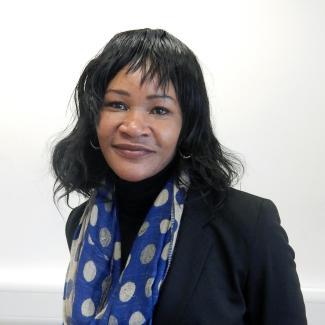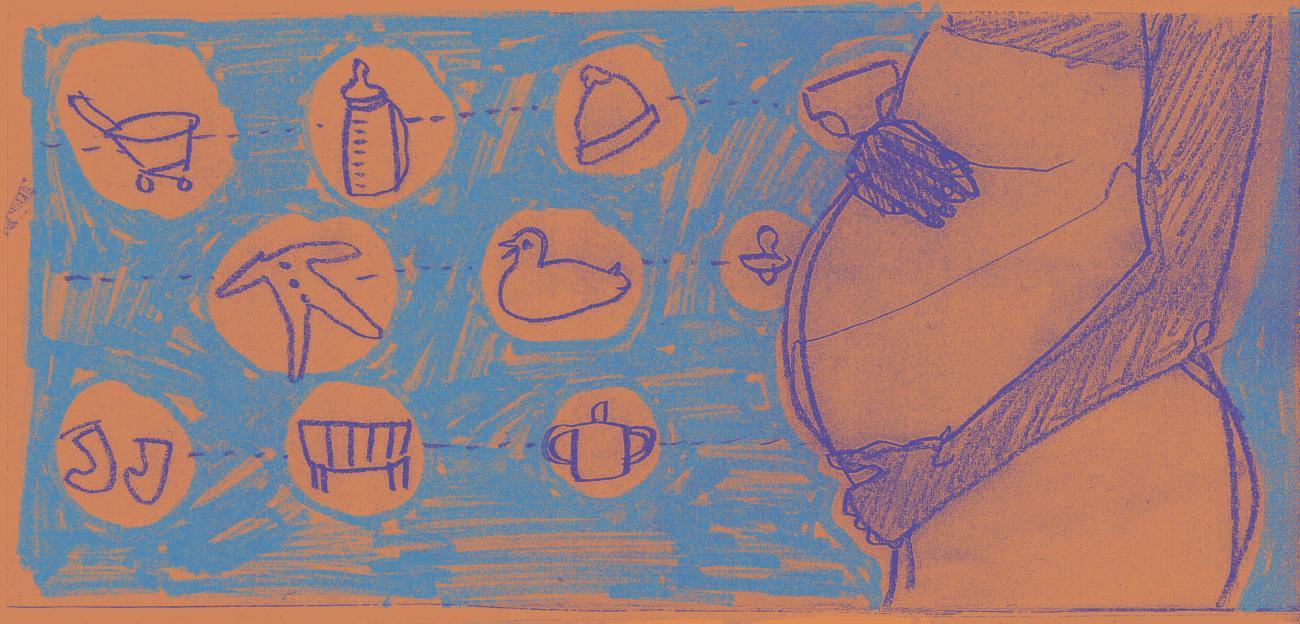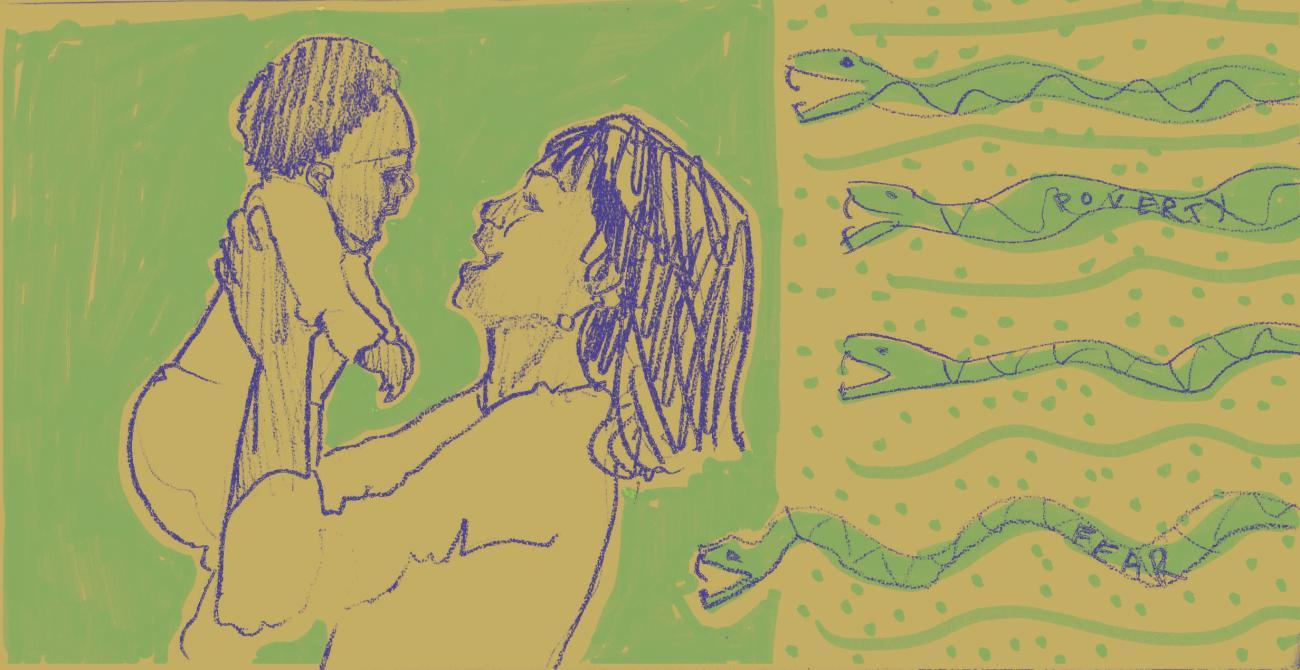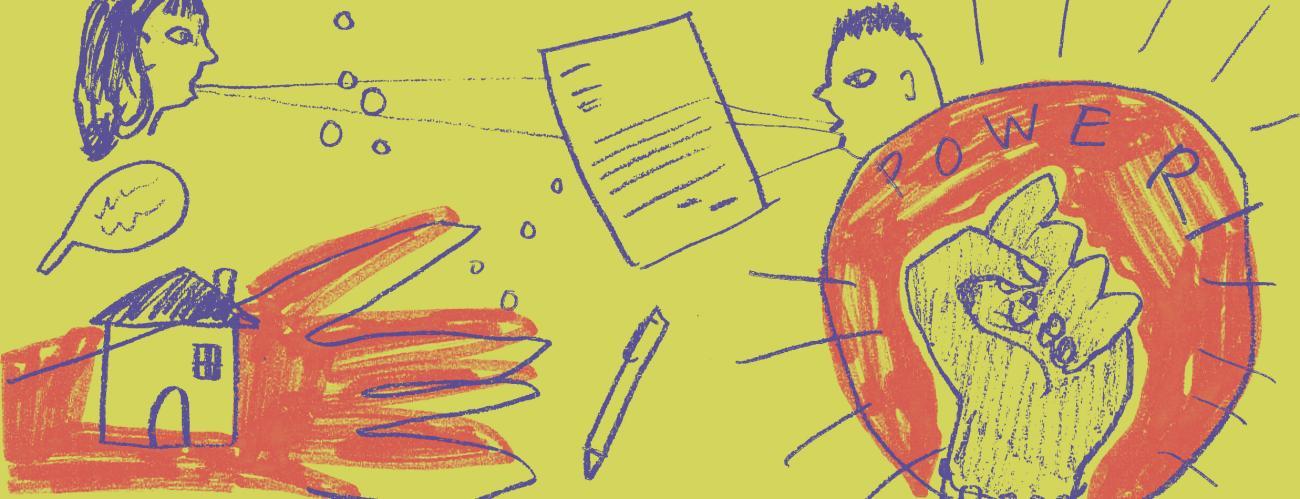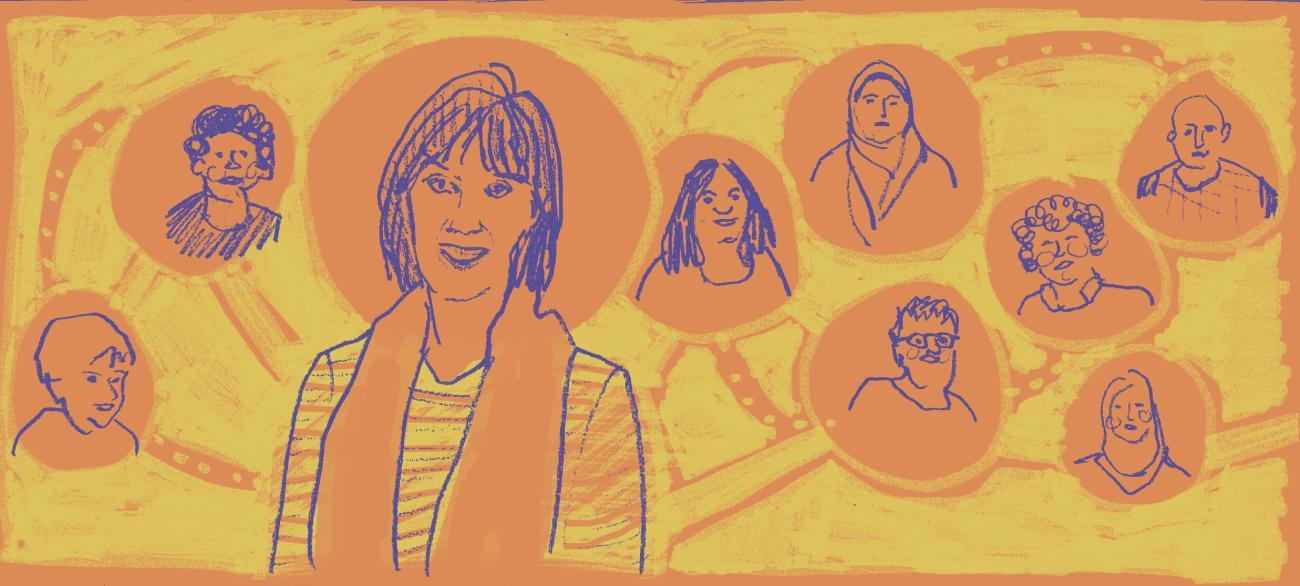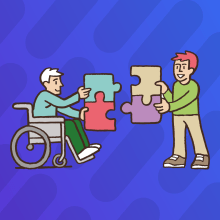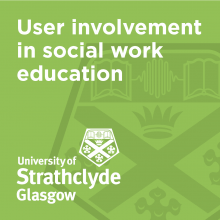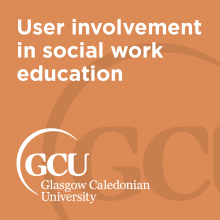Introduction
Olivia Ndoti from the Women's Asylum Support Housing (WASH) project, came to Glasgow Caledonian University to talk to social work students about having No Recourse to Public Funds (NRPF). She spoke powerfully about her interactions with social services and its intersection with the immigration system. Her advocate and PhD researcher, Natalia Farmer, whose ethnographic research is with the Asylum Seeker Housing project (ASH), sat in on the conversation as did Jen Ang, Human Rights lawyer from JustRight Scotland.
When Olivia's son was born, she came into contact with the social work department. It took eight months before she secured the social services support she was entitled to, and it required legal action to achieve it. This is her story.
Olivia in her own words
My name is Olivia Ndoti. I'm from Zambia
Having my baby
Olivia was awaiting the outcome of a human rights application for leave to remain in the UK. She was pregnant, and was being housed by Positive Action in Housing, an independent charity that provides proactive advice, emergency support and free shelter to refugees and migrants at risk of destitution with NRPFs.
However, Olivia had a baby on the way, so approached her local authority for housing and financial support. Being pregnant changed things, with local authorities having a legal duty to safeguard and promote the welfare of her child under Section 22 of the Children (Scotland) Act, 1995. Plus, social services is also NOT a public fund, which is not always understood.
So, having a baby myself, I started asking for support from social work - I think through my midwife when I was I think about eight months, six months pregnant or things like that.. .. My case has been like a human rights case. So human right cases, most of them they've got no recourse to public funds.
Only a few days after giving birth, a meeting with several social workers took place.
I was meeting with social work in the hospital. I had a caesarean, and for social work to come and sit around a table in a meeting with me same week I had caesarean, and leaving the baby in the room to have a meeting with them, sitting myself up - I've just been cut up - was actually, that's when made me to feel this world is actually really cruel, and I didn't even rest any day. I had two pints of blood donated in me that same week and still I was put around questioning which was really - if I wasn't that strong a person I would have really had a mental health state breakdown, but I think it was knowing that there's a child there…
Instead of telling her they had found her suitable accommodation, they questioned her right to live in the UK and what her immigration status would mean for her ability to look after her child. Olivia feared they would take her child away.
I've heard of the social work and I've heard a lot about children being taken away but only through child protection - if there's something really bad with the child - but not when I've not done anything wrong! So why's this coming to me?!
That's when I had to really immediately just heal … and say, 'They're not taking this baby away.' So coming out of the hospital I wasn't actually even extra strong, but I said I don't care if my intestines fall out, these stitches actually fall apart, because I'm trying to protect, to secure the baby not to be taken away. I'm going to do that, but they will be the ones to blame. … I don't know if they'll actually accept the blame…
Looking after me and my child
The hospital wouldn't discharge Olivia until she had somewhere to go. A friend of a friend offered her a room and then Positive Action in Housing stepped in again to provide accommodation after social services refused to house her.
Natalia interjects, and says how hard it was for Olivia to get some money to live on during this time. It took several months, and going through numerous assessments, which Natalia accompanied her to, to eventually receive £25 a week. Significantly, this was also only after, Olivia had engaged legal help.
So I think you were surviving on twenty-five pounds a week weren't you' says Natalia, 'and we had to fight for that, didn't we?.... It was kind of like, 'Well, write down what you need', and you had to keep doing it every week, so it was a constant sort of assessment of how much you might need.
Natalia adds:
Whilst you might have legal representation, going to a social services assessment is really, really intimidating. The ones that I sat through, I was really intimidated, even as an advocate. The questions can be really personal for people, really intrusive. There is a culture of disbelief around this that I found …, so I think someone definitely needs someone to go with them to the social services assessment, or to even advocate for an assessment - which are very difficult to secure.
One of the social work students asks how Olivia managed to get basic equipment for her baby, a crib or a pram? The answer to this was through charities, or the benevolence of people who knew her situation.
You're looking at, there's Red Cross, there's Maryhill Integration Network, there's … Positive Action in Housing, and there are just individual people.
Actually, some people that I don't even know about would hear about my story. I would get money sent to me through letterbox and I once got like a five-hundred-pound cheque fed into Maryhill Integration Network to be given to me. So when you integrate in the community and then you volunteer through different organisations, that's when they know about you, and even if you're not telling them what you're doing they'll be phoning you through emails, text messages, find out what you're doing.
She goes on…
I had one lady as well who, actually every month, she brought a bag of nappies. She got in touch - she found out there's a baby foodbank somewhere in Glasgow - could be Motherwell or Hamilton - and they would give baby clothes and nappies. So every month she applied for me.
The room that I had through Positive Action in Housing became like ..-.. I was lucky that the person that had hosted me was really open to people and they could allow anyone to come home to see me. So my bed became like a sofa and we'd play with the baby, and people dropping in things and checking what I had, what I didn't have, and things like that.
Just before Christmas her local counsellor also came to visit and listen to her story, becoming much more sympathetic and understanding of her plight. Says Olivia:
He was heartbroken and leaving actually left me, out of his own pocket, he said, 'This is my Christmas gift for you' - because this was now December - 'Just in case you've got nothing for Christmas, this is a present for you from me and my wife', and he left me like two-hundred pounds and he was like, 'After Christmas, I'll be on this case', and that's what he did.
The organisations that Olivia volunteers with have also provided crucial support, both practically and emotionally. They checked in with her every week in to see if she was ok and did other things like 'picking us up with the baby, taking us out for a meal, support for taxis as well, going to meetings as well.' Importantly, they gave Olivia the opportunity to give back. She describes how she moved from being more of a companion for asylum seekers entering the country, to more of a community activist following her own experiences.
The rights of my child (and others)
After leaving hospital, Olivia hoped to access housing support so she could move form the one room to something more suitable and permanent for her and her baby. Natalia adds: 'during that time it's like, 'Well, we can accommodate the child but not you.' That's the kind of narrative around it.' - one that threatened loss of her child.
Thankfully, the organisations Olivia volunteered with helped signpost her 'to the right agencies to approach and strong lawyers.'
I'll just read something to you, says Olivia ….my lawyer writing to my social worker…
I'm wondering if Olivia's child, if Olivia actually does in fact have the right to direct financial support from the local authority primarily under section twenty-two of the Children (Scotland) Act 1995, and as I see, the local authority has an obligation to safeguard the welfare of the child and to promote his upbringing in his family". And he went on to say, 'this should really be about housing as well. It should be to the standard of accommodation applicable to the families in social housing, i.e. to have all basic utilities - cooking, laundry. B&B's would not have these facilities' – and that's what we've seen social work would accommodate families into, B&B's… This is actually writing to my social worker, telling him to say, 'This is the law. This is legislation. This family is entitled to this.'
That was like in September 2016. I got the house this year in January 23rd (2018) because I actually refused to go in the B&B. I actually refused. I just said, 'The police will pick me up from the street with a baby - it was almost getting to winter - and if not then they'll bring me up to you and you guys have to find out.' They paid for a B&B but I still refused to go into it, and the lady that hosted me (through the Positive Action in Housing project) also said, 'I'm not having you to go in the B&B with a child. You've had a single room here and I think - I don't understand the law very much, but I think you are entitled to accommodation, so I'll hold on.'
Olivia also recounts how 'us three campaigning ladies' also complained to MSPs, including the First Minister at her constituency 'surgery time' in Govanhill. Coincidence or not,
…that's the morning I got the phone call that we've just gotten a rent scheme for a two-bedroom flat. That was my social worker, and (he said) 'Olivia, didn't know that there was actually such provision for your housing but we've just been told about this, so we've paid for six months for you and so you've got a house. I'll send the details to the house and I can pick you up to go and see the house or you can come and collect the keys.'
As a volunteer and campaigner, Olivia can also recount how others in the system have been affected. Many not as 'lucky' as her.
You're looking at how many families - a lot of families are scared. They're actually scared, because you're looking at the immigration case, which is still on, and all these things, kind of like, makes them step down. … I think a lot of children have been taken away without any good reason, and like Jen (human rights lawyer) has said about the immigration (status), that means those children are illegal when you take them away from (their parent into care) and then (at) eighteen years (old) they have to be removed (from the UK).
In another case, Olivia talks about how the Home Office are refusing to renew the Mum's application to remain, because her child has been taken into care.
They've just taken the child away through other complications, but again, the Home Office are refusing to renew this woman's application. She was granted leave to remain just for two and a half years, but they're refusing to renew it because the child is not with her. So you're looking now at the moment, now it's both parents, mum and child are illegal by the country until then child comes back to the mum. …The Home Office have actually written to the lady to say, 'We can't renew your application because the child is not with you', and she doesn't know where the child has been - one year without even being allowed just a single contact with the child.
What is (and isn't) social work's role
Olivia's case is not an isolated one. Both Jen and Natalia bear this out. Of the six families Natalia worked with at ASH, she says: 'all the families that I dealt with were NRPF and they were all at the time street destitute with children.'
So what's social works role in all of this? Today's session was designed, after all, to help future social workers answer this.
Duty to provide an assessment and signpost to legal expertise
Olivia's experiences and Natalia's research reveal some of the issues around securing a social work assessment. These suggest that many social workers lack or misunderstand their roles in this area. Natalia says:
I interviewed someone from the voluntary sector who was trying to advocate for a child in need of assessment, and she said, 'We're experiencing that even the proper assessment is not conducted. We have to get a lawyer to ask them to conduct a human rights assessment, then they again don't send a written decision.' So again, I was saying, advocating on behalf of NRPF families, a lot of the times it will need a lawyer to press social services to conduct a child in need assessment.
The importance of timely legal expertise, and general awareness of the law is also highlighted. Speaking about her involvement with ASH and WASH, Natalia says:
Basically legal action had to be taken to secure support in all my cases ... every single case needed legal representation with the local authority. So with ASH and WASH we were an advocacy service and we tried to advocate on behalf of NRPF families, but it all needed legal intervention in some form. So it's really important that NRPF families get that legal advice straight away really.
Natalia also problematizes Getting it Right for Every Child (GIRFEC) and recounts one social worker telling her: 'We don't carry out human rights assessments, we only assess through the GIRFEC process.' '(But) it's not sufficient for NRPF families' says Natalia. It doesn't address a lot of the concerns here.
… people are being told they could accommodate the child but not the parent. Again, I've sat in assessments where this has been said. So it's said in a very kind of subtle manner, 'Well, we kind of have a duty to the child but not you, you do know that?' Again, it really frightens people. … they think they're going to have the child removed because of their immigration status. They're not going to go back to social services!
In practice, it also sounds like families are not receiving the help they are entitled to because different public services are not working well together, and referring on to those who can help.
.. a lot of families will present at a homeless team… and are told, 'You don't have any recourse to public funds', because housing sits under no recourse to public funds. (However) at that point in time, if they've got children they should be referred to children and families team, which wasn't happening in a lot of the case studies that I saw….That's why … it's important to have someone there that knows, 'Right, we need to go to children and families', because as I said, children and families isn't a public fund.
Training that provides a basic awareness of the law is required in Glasgow, Natalia argues. This would help better signposting and may prevent the need for legal action to secure support.
Social workers are not immigration lawyers
Both Jen and Natalia stress that it's not social work's role to make legal judgements based on or about peoples' immigration status. Natalia recounts:
I've been in meetings myself where I've heard, you know, 'You shouldn't be here because you're an illegal immigrant', you know, and that person got leave to remain in the end and it was never a case of someone being illegal at all.
I said we are not coming to ask for advice for immigration, we asked for a house because of the rules of Scotland. … Their advice straight away was you're not allowed to stay in this country. You are not eligible to stay in this country. Okay, now giving immigration advice as a social worker is actually illegal.
… giving immigration advice, it's a really complex area, so you can't be giving immigration advice. It could be hugely complex as to why someone can't return back to their country of origin… So I think the problem here is for me is social workers assessing people as illegal or not illegal, undeserving or deserving.
Olivia also highlights how her lawyer wrote to her local council, complaining about social work practice of phoning the Home Office to enquire about people's immigration case. 'That's not their area. It's to you look at the family - the mum and the child.' She also describes a conversation with the aforementioned counsellor, who himself is puzzled as to why his local authority hadn't been able to provide her with accommodation.
'Why has this (happened)? Do you understand that we've got sixty housing associations in Glasgow?' I said, 'You're just telling me that, I don't know anything about that.' 'So why can't they give you a single room? You reported to the Home Office?' I said, 'Yes.' 'So they know, the Home Office, that you're here?' I said, 'Yes.' 'So why is this like difficult?' I said, 'I can't answer that to you, but this is what I've been doing.'
Today
Olivia now has leave to remain. However, she says 'I wouldn't be sitting in this room if it wasn't actually FOR coming across Natalia.' Natalia has clearly played an important role as an advocate, but also a friend.
…but yeah, to cut the story short, when I was in hospital, I don't know where this person came from, she just referred to me. I was told not to worry, this is someone who is actually doing a research over this, and yeah, it was really like a pal for a stage that I'm in hospital, I had text messages, I had phone calls, and the organisation now outside campaigning while I was still in hospital, and then not knowing what was going to happen.
Olivia gives full credit to the support she got both from individuals in her community, and the voluntary and campaigning organisations who helped her - and who she volunteers with. They are clearly filling a large gap, not met by statutory authorities.
…if I had not integrated very well I would have actually found myself in a very, very bad situation or maybe I wouldn't be sitting here and saying I've got my son after he was born. I'm thinking he would have been taken away from me, but I think I knew the right agencies to approach to ask for advice and I had strong lawyers…
To end
Olivia says:
So yeah, it's been a great journey and I'm now supporting a lot of mothers and families that are going through that, because if they've not done any wrong, why should you have to save your child? You're a mother, you don't have support. So we can't support you, and why should it take seven months to actually look into helping a baby who's got nothing?
Some of her remarks about social work might sting a bit.
I think it's just a wrong practice looking at how to go online and read what social work was about, and it shows good stuff, but what was happening to me and other people that I know, was actually not the practice that social work's supposed to be practising.
She talks about going from feeling like she was pulling through to 'feeling weak' due to her dealings with social work and fear of losing her child. Olivia recounts a conversation she had with her social worker.
I once asked him, 'Do you have children?' He said, 'Yes, I've got children', and I'm like, 'Do you have a social worker yourself?'
The social worker's response shows, perhaps, an awareness of the iniquitous situation, sharing with Olivia awareness of his own (imperfect) parenting skills, while being in the position of assessing hers.
I think he found me very challenging, and he found me to be a person who was actually very good with their child, because he would come home and watch me play with the child and things like that. And I made time for him, because making time for him was - I wanted this case off me so I can concentrate on looking after the baby.
He actually opened up to me and said, 'This is not what I actually practiced and studied (for)…'. He looked at my son and said, 'I question myself what I'm doing.'
Of her social worker, she says:
I knew he was doing his work, and to me it's the person that I'll never blame because he's actually answering to someone else in that department. …So if I was to blame someone regarding what I went through I'd blame the top bosses, not actually my immediate social worker who was actually there.
I know he didn't have the power to actually say, 'I'm saying that this money is for Olivia to take.' Maybe he would have wanted to do that, but he has to actually explain to someone.
I think that's a key thing' says Natalia… strategically trying to find a way to kind of challenge this, because to release the funds to provide financial accommodation or to provide assistance, it's not going to be actually the social worker. It'll be higher up, and it could be two or three chains of command higher up as well. So how we as social workers tackle that as well I think is a really important question.
Olivia's asked what, within the limitations of her social worker's power, he could have done better? She ponders whether he should have sacrificed his job, saying 'I don't care if I lose it, I need money for this family?' Certainly, she adds 'He should have just made so much noise!'
Summary of key points
As a social worker, what is critical to understand is:
- Immigration law is complex, but an awareness of its intersection with social care legislation in Scotland - and in particular, social work's obligation to children and families regardless of migration status - is crucial to deliver on the rights of children and vulnerable adults.
- Many people in the immigration system have no recourse to public funds (NRPF). However, many forms of support, including accommodation and financial support under the Children (Scotland) Act 1995, is NOT a public fund and can be accessed.
- The Children (Scotland) Act1995 empowers local authorities to provide services, not just to the child, but to their family if in alignment with promoting their safety, wellbeing and rights to a family life. The Social Work (Scotland) Act 1968 can similarly be used to provide support for vulnerable adults, if necessary to prevent a breach of human rights.
- Currently, legal action - or the threat of it - is often required to ensure local authorities deliver the support people are entitled to, which can include securing a human rights/child in need assessment as a first step.
- Social workers need to understand where and when to signpost to highly specialist legal advice, and do so speedily. Legal aid is not a prohibited public fund, and therefore migrant children and families have the right to legal advice and representation by a legal aid lawyer, if they require it.
- It is not social work's role to check, or pass judgement on anyone's immigration status or deny support to children and families or vulnerable adults who are destitute and homeless on this basis. It is their role, foremost, to protect and promote welfare. Whilst social workers may be required to consider immigration status as a relevant factor in conducting human rights assessment, this must be done alongside a full holistic assessment of needs and resources. Social workers also need to consider whether they would be breaching rights legislation if they were to refuse support.
- Social workers are prohibited by law from offering immigration advice (unless they are specially accredited to do so by the Office of the Immigration Services Commissioner).
- It needs to be acknowledged that there is real fear and mistrust of social services within migrant communities.
- Inter-agency working matters: with trusted voluntary/charitable organisations and advocates; with housing, to ensure children and families are signposted to those who can help them to prevent homelessness, destitution and further trauma.
- There are 'hidden vulnerable groups' who need support, such as migrant children taken into care, who risk being removed from the UK at 18 unless they are timely signposted to specialist legal advice.
See the companion case study to this, which shows how Olivia has used her lived experience as an activist and educator to support social work students at GCU.
